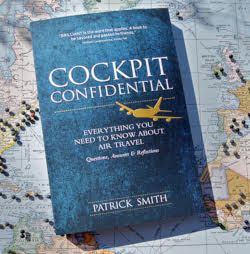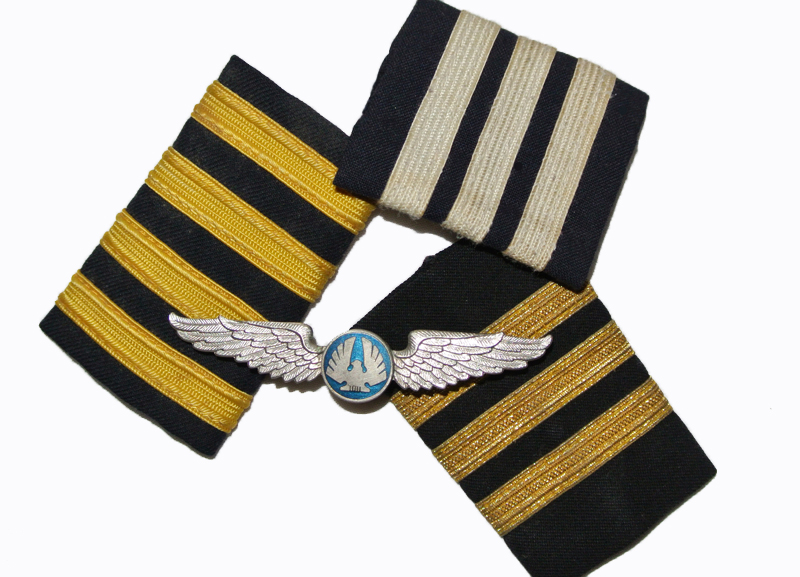Pilots and Copilots. Who are These People?
February 18, 2014
DEAR ASSOCIATED PRESS (and most other media outlets):
Please pay closer attention to use of the phrase “the pilot” in your stories. This is one of those commonly repeated tics that always gets my goat, resulting in pedantic, vaguely neurotic rants like this one.
“The pilot” did this, “the pilot” did that. Well, which pilot exactly, because there are always at least two pilots in a jetliner cockpit — a captain and first officer — and both of these individuals are fully qualified to operate the aircraft.
Use of the singular implies that the other person in the cockpit is something other than, and presumably less than, an actual pilot. I’m not sure if reporters have a style guide for these things, but this is nothing a simple “s” can’t fix: “the pilots.” Alternately you could say “the cockpit crew.” If a differentiation in rank is needed, I’d recommend using “captain” and “first officer.” Just be aware that either pilot may be at the controls during a particular incident.
The first officer is known colloquially as the copilot. But a copilot is not an apprentice. He or she shares flying duties with the captain more or less equally. The captain is officially in charge, and earns a larger paycheck to accompany that responsibility, but both individuals fly the aircraft. Copilots perform just as many takeoffs and landings as captains do, and both are part of the decision-making process.
In fact, while protocols might be slightly different carrier to carrier, it’s not unusual during emergencies or other abnormal situations for the captain to delegate hands-on flying duties to the copilot, so that the captain can concentrate on communications, troubleshooting, coordinating the checklists, etc.
Do I seem sensitive about this? That’s because I’m a copilot.
A copilot becomes a captain not by virtue of skill or experience, but rather when his or her seniority standing allows it. And not every copilot wants to become a captain right away. Airline seniority bidding is a complicated thing, and a pilot can often have a more comfortable quality of life — salary, aircraft assignment, schedule and choice of destinations — as a senior copilot than as a junior captain. Thus, at a given airline, there are plenty of copilots who are older and more experienced than many captains.
In some parts of the world, including parts of Asia, the experience disparity between captains and copilots tends to be more pronounced. The typical major airline new-hire in the United States tends to be a lot more experienced than the typical new-hire in Europe or Asia. But not always, and the raw totals in a pilot’s logbook are only part of the story and not necessarily representative of skill or talent. Airline training is never easy, and any pilot, no matter how young or comparatively inexperienced, needs to be good to succeed at that level. And once you’re there, cockpit duties are always shared equally and even the least experienced copilot is by any measure a pilot, trained and certified to fly the airplane.
It can vary country to country, but captains usually wear four stripes on their sleeves and epaulets; copilots wear three.
On older planes there was a third cockpit station occupied by the second officer, also known as the flight engineer. (I spent four years as a flight engineer on a cargo jet in the mid-1990s.) Once upon a time planes also carried navigators, but the last known navigator in these parts was the old Howard Borden character from the original “Bob Newhart Show.”
Long-haul flights carry augmented crews that work in shifts. There might be two copilots and a captain; two captains and a copilot; or maybe two captains and two copilots. It varies airline to airline and with the length of flight. For example, at my airline, a ten-hour flight will carry three pilots: two copilots and a captain. Each crew member will have roughly one-third of the flight free. He or she retires to a bunk room or designated crew rest seat, while the other two remain up front.
Epaulets photo by the author.







Leave a Comment
Maximum 1500 characters. Watch your spelling and grammar. Poorly written posts will be deleted!
38 Responses to “Pilots and Copilots. Who are These People?”
You are viewing newest comments first. Click to reverse order
Any thoughts about “Pilot monitoring” vs. “Pilot flying?” Are those “taboo terms” among the “cool kids”?
And what about “Pilot in Command”? Is that a “touchy subject”, too?
Is that always the “Pilot flying”, or is it necessarily the flight’s captain, who, AFAIK, ultimately carries final authority and responsibility for the craft, the flight and everyone aboard.
[…] Nick Carson – Favorite Flight or Shuttle Hop? Part 2 Paul Thorp – Capt/FO, PF/PM Pilots and Copilots. Who are These People? Bruce – Bumper and Air Asia Jorge – Drones!! Coastie Jim – Family Life Question […]
> “the pilots.” Alternately you could say “the cockpit crew.”
How about “flight crew”?
Does that serve the purpose of non-hierarchically specifying “Those Persons Who Tell The Computers Where To Fly the Plane?”
From the back of the cabin, where we spend our hours watching pilot training vids on youTube, you “guys” [in the gender-neutral sense] only get to fly when things get a) interesting, b) *really* interesting or c) terrifying.
From back here, where most flights seem *mighty* dull, you guys spent all those training years and simulator hours merely waiting to leap into action.
Just between us gurls, do you sometimes hope for something “interesting” happening on a long flight? Maybe dream of doing a few barrel rolls, or inverted flight, or practice some spin recovery or inverted stall recovery or maybe buzz the grazing cows?
Wouldn’t that be lovely fun for everyone concerned?
Last I heard, the pilot is the guy supervising the woman who’s supervising the computer that flies the plane, all of which are supervised by a small, bite-prone dog that ensures nobody messes with the computer.
Or so I’ve heard…
The hardware in the photo is from your first paying gig: Bar Harbor.
If the prize on offer is yet to be claimed, this attentive (and entertained) reader will be happy to take it off your hands.
RE: the wings in the photo. American Airlines? Looks like the AA Eagle, but that’s just my guess.
[…] Smith at AskThePilot.com has ranted on a subject I have ranted on before. There are at minimum two people working in an airline […]
[…] are two pilots, always. But the gist of this is […]
[…] Here we go again with “the pilot,” as if a commercial jetliner has only a single pilot. You would think, that after decades of covering commercial aviation, a major newspaper would understand there are always a minimum of two pilots in the cockpit: a captain and a first officer. They both are fully qualified pilots. They both perform takeoffs and landings, and both are certified to operate the aircraft in all regimes of flight. A first officer is not an apprentice. More here. […]
Well Patrick all I can say is, you are a pilot and great writer, and you have refined taste in music, and if you’ll pardon the plagiarism ….Jordan “ain’t nothin but a bus driver in the sky”! 🙂 Keep up the good work.
The job of the co-pilot is to make the captain look good.
The job of the co-pilot is to watch the computer and feed the dog until the captain is finished eating his fish dinner and knocking back Tequila shots and Barcardi 151 and Coke.
Also, on 747s, it’s the captain’s responsibility to ensure cabin crew “satisfaction” with the “entertainment” features of the crew’s “attic”.
Also, the captain has to make the announcement “This Is Your Captain Speaking”.
A poem from the bad old days …
I am the copilot, I sit on the right.
It´s up to me to be quick and bright
I never talk back for I have regrets,
But I have to remember what the Captain forgets.
I make out the flight plan and study the weather
Pull up the gear, stand by to feather;
Make out the mail forms and do the reporting
And fly the old crate while the Captain is courting.
I take the readings, adjust the power,
Put on the heaters when we’re in a shower;
Tell him where we are on the darkest night,
And do all the book work without any light.
I call for my Captain and buy him cokes;
I always laugh at his corny jokes,
And once in a while when his landings are rusty,
I always come through with, “My gosh, it’s gusty!”
All in all I’m a general stooge
As I sit to the right of the man I call “Scrooge”;
I guess you think that is past understanding,
But maybe some day he will give me a landing.
> I never talk back for I have regrets,
“Bad ol’ days” is EXACTLY correct.
I bet we could find a THOUSAND accidents among the US FAA investigations preventable if somebody “spoke up” on the flight deck when things started to “go sideways”, but long before “the monster was loose in the hold”.
How about this: the pilot is the one who is at the controls and actually flying the kite at the time under discussion, whether it’s the captain or the first officer or even a bold flight attendant?
Patrick-
Been reading your column for years and love it. I have your first book and it explained everything to me so that when I fly now, I know what that
“sound” was, etc. Don’t get bogged down with reading the comments folks leave. Some people just want to be negative.
I’m not a pilot, copilot, first officer, flight attendant, counter agent, mechanic, baggage handler, airport maintenance or a fast food server along the concourse. Just an occasional flier who enjoys your writing style and the original insights you provide.
You do a great job, Patrick. Don’t let the bastards get you down.
I somewhat agree with you Rusty. I concur that pilots tend to be highly observant and critical when on the job, in the cockpit, but I’m not certain how much this extends into the rest of their lives. For example, it always amazes me that some pilots can travel over and over and over again to the same foreign country, yet still have no idea what the correct name of the local currency is!
If you’re going to be a pedant, Patrick, I completely support you, but please stop pretending all flight crew are HIM. Yes, I recognize that female pilots are somewhat rare, but language matters, as you are rightly pointing out here. “Them” is a perfectly good substitute. Compare:
… copilot to be older and more experienced than the captain sitting next to him.
… copilot to be older and more experienced than the captain sitting next to them.
Thank you.
Oh come on now, I’ve been good at giving female pilots their fair due. Remember this one…
http://www.salon.com/2008/09/12/askthepilot290/
It’s not about choosing one gender over the other. It’s a style thing, i.e. making the sentence sound right. In a sentence in which I’m talking about pilots in general, there are only so many uses of “him or her,” or “he or she” that I can get away with before the syntax gets clunky. Meanwhile if I use “she” or “her” exclusively, it jumps out at you and steals attention away from whatever point I’m making.
“Them” is not a good substitute. I wish it was, but it’s not. It’s grammatically wrong. “Them” is plural, and if I’m referring to a pilot, singular, I can’t use it. I can change the entire sentence so that I’m speaking of pilots in the plural — in fact I often do this, precisely to be gender-neutral — but it doesn’t always sound right and sometimes feels forced, so I default to “he” or “him.” It’s maybe a bit unfair, but the language is a lot smoother this way.
– PS
Patrick,
This just proves that pedantry can cut both ways. Agreement in gender is much more important (to me) than agreement in number, and many professionals concur with that stance. “Sounding right” comes completely from our culture, and in communities where “they” and “them” are commonly used to refer to one person of unknown gender, it sounds totally normal. Certainly, I use/see it in my work on a regular basis, though we tend to rewrite to get rid of tricky pronouns so that the work can be translated more easily.
🙂
http://www.oxforddictionaries.com/us/words/he-or-she-versus-they
Hey, you know what? Make you a deal? Keep writing your awesome blog and flying planes. I’ll keep reading your blog, enjoying it, and referring terrified turbulence-encounterers to it. And I’ll keep doing what I do for a living — technical writing and editing.
Julia
Ay, so much attitude in the comments on this post. First Jordan the most unfun cocktail party guest ever throws his toys out of the crib and now this silly argument about pronouns. Oh my, you’re a technical writer! And yet your suggestion, “…sitting next to them,” is hilariously terrible. I don’t know why I feel the need to throw my support in here, but Patrick, a professional pilot and professional writer, is a fine writer. The latest version of his book was quite good—well-written and all that—at least I think so.
-A professional editor
“Ay, so much attitude in the comments on this post.”
Yeah, quite something.
We professional editors seem to be outnumbering the airline pilots here.
Let’s start with JuliaZ’s concerns. There’s no easy way to be gender-neutral and graceful at the same time, but Patrick has always gone out of his way to make it clear that he isn’t forgetting female pilots. I also work the translating end of things and I can assure you that the fastest way to screw up perfectly good French is to make it “gender-neutral”.
As for Jordan, he spares no effort to be aggressive, does he? “If English isn’t your first language (…) A little history lesson …”
Lighten up, Captain.
Patrick,
You are good at explaining some of the shit pilots say. Explaining our friend Jordan does is a perfect pilot reaction. Pilots are observant and critical. We constantly watch the other guy in the cockpit and critique him in our minds. We critique our friends, family, kids and everyone else we come in contact with. Jordan critiques Patrick and I critique Jordan! 🙂
Rusty
You make a good point, Rusty.
However, I still doubt Jordan is a pilot. Not just because he writes like a twelve year old, but but because he didn’t really critique Patrick, as you explained pilots usually do. I looked again, but I just couldn’t find any critiquing between all the vitriol in his post. 😉
I dont like the sound of that. Many accidents are related to pilots not working well together, or not getting along. Why, I dont know. Pride? Afraid of admitting mistakes? Jealousy?
And of course the good old “I didnt dare questioning the Captain”.
If you guys in front dont get along, dont expect your passengers to behave.
The semantics are the sticking point. If you put the word “co” in front of something, it means “shared in”, as in co-creator, co-authored, etc. Technically, BOTH pilots are copilots; they are sharing the duties of flying the plane. You could say that there are two pilots, that there are two copilots, etc., and you’d be right on both accounts. A (co)pilot is a role; not a title.
Now, if you want to talk titles, then there is a Captain and a First Officer, etc. You need to designate one of the two (co)pilots as the person in charge, thus the titles. By mixing the titles with the role, it causes confusion for the passengers, and irritation for Patrick. 🙂
Pilot and copilot are not even different roles. They are exactly the same. A co-pilot is just “another” pilot, just like a co-founder is just the “other” founder. Not less, not more.
I find this article incredibly ironic considering that your website is http://www.askthepilot.com
Ironic how? I’m not sure that I understand. Rather than ironic, it’s exactly in line with what I’m saying. What am I missing?
It’s because you’re bitching about people using the term “pilot”.
“…use of the term “pilot” to describe the captain suggests the first officer was, by definition, something other than — and presumably less than — an actual pilot..”
No, it suggests that the first officer was by definition the copilot. You previously acknowledged that the first officer is also known as the copilot and then you chose your words carefully in the sentence I quoted.
If English isn’t your first language I’ll let you know that the “co” in front of “pilot” is there to indicate that the copilot is there in assistance of a pilot or to supplement the pilot.
A little history lesson. Aircraft were generally flown by one pilot. When the need arose for them to add another pilot they named this position the copilot position which could be held by someone who was qualified to assist the pilot in flying the aircraft.
The person in the right seat can be referred to as: copilot, first officer, second in command, or even pilot.
“It varies country to country, airline to airline, but in the U.S., captains wear four stripes on their sleeves and epaulets; copilots wear three.”
Again, referring to the first officer as the copilot. Even you can’t get your terms to match up! How do you expect someone, who isn’t even close to being an expert in aviation, to properly use these terms?
Source: I’m an airline pilot. I hold the position of Captain. I have held the position of FO before.
Jordan, you seem to be missing the point. Patrick ostensibly accepts the colloquial use of copilot (first officer), but not pilot (captain), and has completely remained within his own usage rules. You seem to be confusing your usage rules with his. Further, you try to support your argument with a rather patronizing couple of paragraphs on the etymology of co and copilot…and the history lesson on how copilots came into being. Why not just politely disagree?
Patrick, back to the point i made about colloquial use of pilot and copilot. I’ve wondered why you seem to accept copilot, but not pilot. There is a strong case to be made based on the articles you mention that colloquially “pilot” means captain. To accept copilot as part of vernacular, but not pilot doesn’t seem to make sense…especially if consider that the average person would most likely associate pilot with captain. On the other hand, the press should for clarity, avoid colloquialisms.
Why the anger?
He’s an airline pilot who takes issue with my work, and with my website.
I get nasty letters from pilots from time to time. The majority of fellow pilots who write in are supportive and complimentary. Those who are not supportive, however, almost never disagree politely. There’s always a belligerence to their tone.
What I think happens is this:
A pilot is digging around the Web for something and stumbles across my site. Or maybe he heard one of my interviews. “What’s this?” he thinks. “A pilot writing about our job and our business? Who is this guy? What makes him so qualified to speak for the rest of us? What’s his problem?” It catches him by surprise, because what I do is so unusual, and so not in normal pilot culture. Worse, it’s not just cut-and-dry, boring informational stuff; there’s some flair and humor to it, which really rankles him. “Who does this guy think he is!” And he begins poking around the site, looking for something to take issue with.
Jordan had to find something to squabble about, in order to register contempt and disapproval for what I do, and seized on this weird semantic argument over my use of the word “copilot.”
And it bothers me. It bothers me off because I put a lot of work into my writing, and I feel that it serves a good purpose: educating and entertaining people, myth-busting, etc. Consider all of the bad information out there, and all of the sensationalist and misleading crap that the media is constantly shoveling at people, including plenty of stuff that undermines and insults the piloting profession, and here these people, my own colleagues, take issue with me.
It’s really irritating.
I was once on a virgin Australia flight from Canberra to Sydney, after reading a lot of your work i really appreciated that when to captain introduced the first officer he mentioned that he would be at the controls for that leg. I wonder how many passenger felt uneasy with not having the captain flying.
As you rightly say, a pedantic, vaguely neurotic rant.
I would even go further, Patrick. I have an issue with calling the First Office the copilot. The prefix co-, by definition indicates “partnership or equality” (dictionary.com), such as coworker, cofounder, etc. The person working next to me is my “coworker”, and I am his “coworker”. So just as both of us can be workers and coworkers at the same time, both the Captain and the First Officer are pilots, or together copilots.
I spent several years in the airline industry (albeit in computer technology) so I have always been interested in the industry. I fully understand the difference between the “pilot” (Captain) and “copilot” (First officer). What I liked about your article was showing that the First Officer may have more experience and getting better assignments than the Captain!